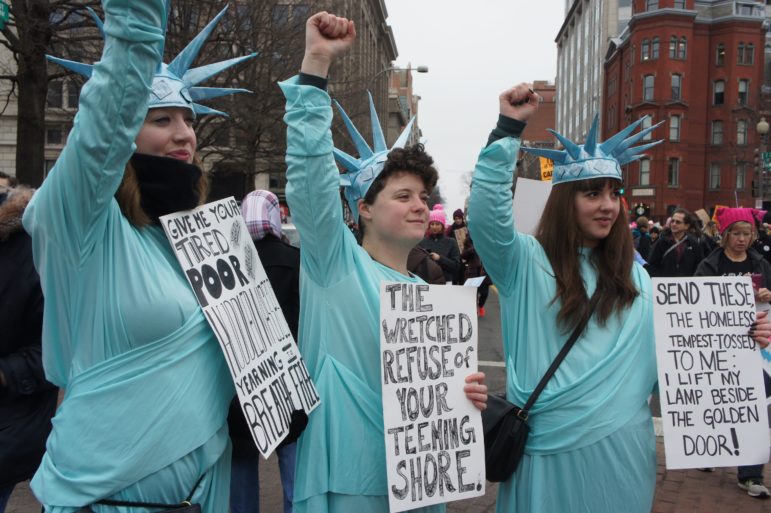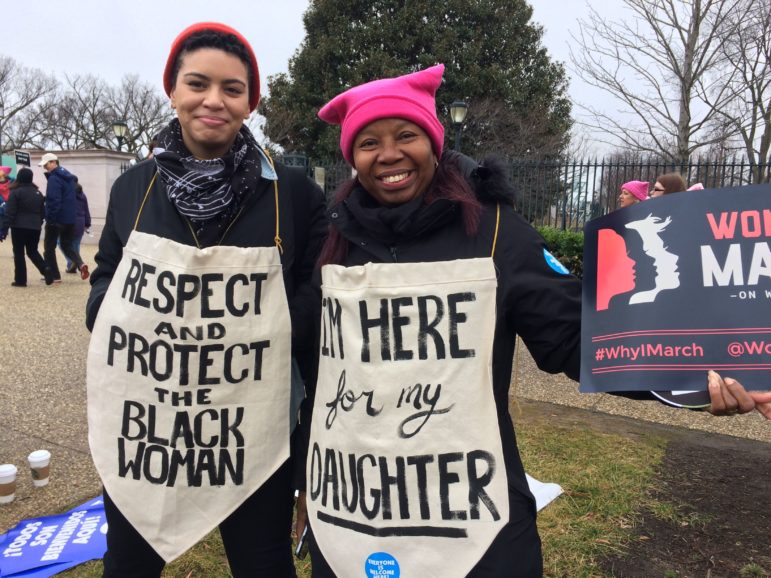WASHINGTON — A sea of pink “pussycat hats,” many home-knitted, surged down the streets of Washington, District of Columbia, on the heads of women and girls taking part in the huge multigenerational Women’s March on Washington on Saturday.
March organizers wanted to make sure the voices of girls were heard. They named a roster of teenage youth ambassadors who are active in bringing change to their own communities.
The event in opposition to President Donald Trump drew more than 500,000 people, according to organizers, exceeding the number expected by Homeland Security and exceeding the number of people who attended Friday’s inauguration.
“I can’t vote, but I want to have a say,” said Claire, 14, who was one of the marchers but did not want to give her last name. “I want a good future,” she said.
Skylar Hawes, 14, from Loudon County, Virginia, said: “I feel women have a fundamental right to be heard.”
Chloe Jasper, 23, of New York City said: “I feel scared about LGBTQ rights, women’s rights, climate change and police brutality towards black young men [under a Trump administration].”

Photos by Stell Simonton
.
Another marcher who identified herself only as Sophia, 23, also of New York City, said: “Trump is a huge threat to women.” He uses “misogynistic rhetoric,” she said.
The pink hats with cat ears were a protest of Trump’s comments about women made on a video that surfaced before the election.
While Inauguration Day brought supporters of the new president to town, the Women’s March brought young and old people voicing dissent.
Candace Wilkinson-Davis, 28, held up a sign that said: “I am a gay Christian, and I make America great.”
“I think Donald Trump has expressed a lot of hate against diverse groups, races and genders,” she said.
She’s worried about climate change, which President Trump called a hoax during the campaign. Candace said she was concerned about the effect of burning more coal and of possible deregulation of industry under a Trump administration.
She and her partner, Careth Wilkinson-Davis, are from Washington.

The march also had a celebratory spirit, with dancing in the street and creative and provocative signs. Men and boys also took part.
One young man held a sign: “Don’t grope my mother.”
Other signs read: “We Grab Back,” “Dissent is Patriotic,” “You Work for Us.”
Young women came with friends and in family groups. Many mother-daughter pairs were there.
Guadalupe Jacobson-Peregrino, 18, came with her mother, a member of the Baltimore Teachers Union, and other union members.
She said she was there to support the right of her mother to be in a union. She also said she wants to make sure teachers continue to teach students about climate change and global warming.
Gillian Gravatt, 13, came with her mother. Her grandmother, Peggy Romberg, was a long-time lobbyist for women’s reproductive rights in Texas.
Indigo Caroll, 16, of Keene, New Hampshire, walked with her sister, Blazon, 10. “It’s all about equality,” Indigo said.
Among the march organizers who reached out to youth to participate were Sonia Bhuta, executive director of South Asian Youth Action, Maria Teresa Kumar, CEO of VotoLatino, and Reshma Saujani, CEO and founder of Girls Who Code.





























